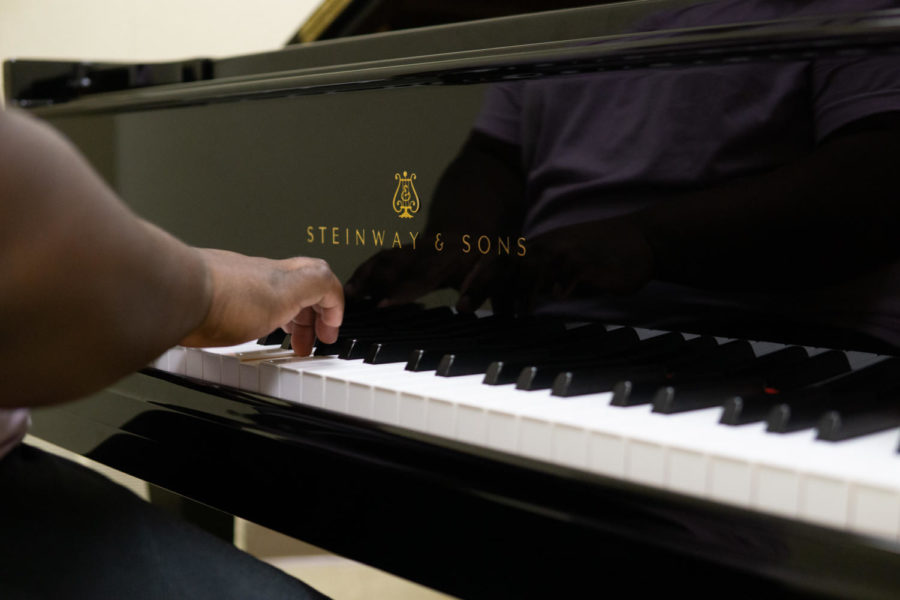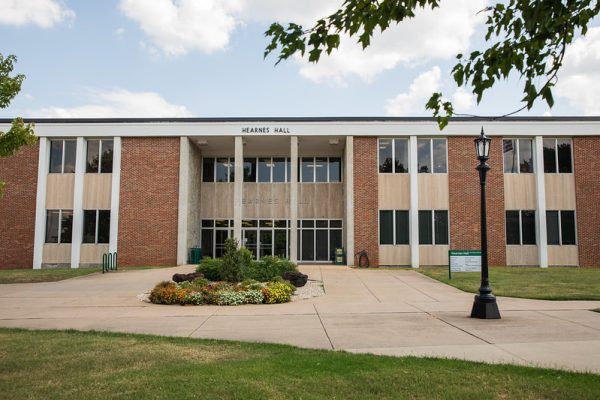Starting on the right note
Jemetris Brown, senior general studies major, practices “Misty” by Erroll Garner on the new Steinway & Sons grand piano.
The music department at Missouri Southern recently acquired 12 new upright practice pianos and a new grand piano as part of the All-Steinway School initiative.
According to Dr. Keith Talley, music department chair, this is a designation that the piano company Steinway & Sons sets aside for institutions of higher education where at least 90% of the musical equipment are Steinway & Sons products. Schools that are part of the initiative include The Julliard School, Leeds College of Music, and Royal Welsh College of Music & Drama.
Steinway & Sons is a piano company founded in 1853 by Henry E. Steinway. The company has received numerous awards for the craftmanship of their products.
To begin the initiative, representatives from the Schmitt Music company in Kansas City and Steinway & Sons in New York gave a presentation to members of University administration about a proposal for the All-Steinway School initiative.
Talley said taking action on this initiative came at a good time, as the department’s previous practice pianos has been thoroughly used over the decades and the grand piano was over 100 years old, built in 1905.
According to Talley, the project would be expensive, and it seemed that it would not be financially feasible in the short term. However, members of the President’s Council still wanted to support it, Talley said, and they authorized funds to replace the department’s practice pianos.
According to Talley, the President’s Council set aside approximately $120,000 for the practice pianos, along with an extra $5,000 for humidity control units to help keep the temperature and humidity levels more constant which will extend the life of the pianos even further.
Because practice pianos are less expensive, the grand piano cost nearly half the price of all the uprights, priced at approximately $75,000.
However, Talley said to complete the All-Steinway School initiative, the University would need to refurbish or replace the department’s other grand pianos, which would be a costly project that would likely happen over a longer period of time.
Since all music majors must play piano as part of their degree program, the new pianos were an immediate help.
“All the students who are practicing their piano skills are able to play quality instruments which stay in tune longer and have better technical response, and they are much more enjoyable to play,” said Talley.
At the same time, the department was searching for potential donors to help with the performance pianos and grand pianos, and local businessman and philanthropist Robert Corley was able to fund a new grand piano purchase for a practice room in the department.
Additionally, since students perform with a pianist, Talley said it makes it a more enjoyable experience to rehearse and play with a piano that plays well, which helps with collaborative music-making of a soloist and pianist performing together.
While senior general studies major Jemetris Brown practiced “Misty” by Erroll Garner, he took notice of the quality of the grand piano.
“Playing on something that’s in-tune and feels good makes the practicing experience a lot better,” Brown said. “It’s very smooth — I don’t have to press so hard. The keys work great.”
“At the end of the day, we still have much better-quality pianos than we did last year and that’s fantastic for the students,” said Talley. “It’s a great time to be a music major.”
Talley said that along with the new pianos, they also acquired nine additional practice rooms, located in the basement of the Mills Anderson Justice Center, where the Franklin Technology Center had previously had offices.
Not only were they able to acquire new instruments, but this also doubled their practice space. He anticipates that the uprights will last around 20-30 years with maintenance and the grand piano should easily last 50 years.
“I think these pianos will go through generations of students,” said Talley.
Your donation will support the student journalists of Missouri Southern State University. Your contribution will allow us to purchase equipment and cover our annual website hosting costs.






























